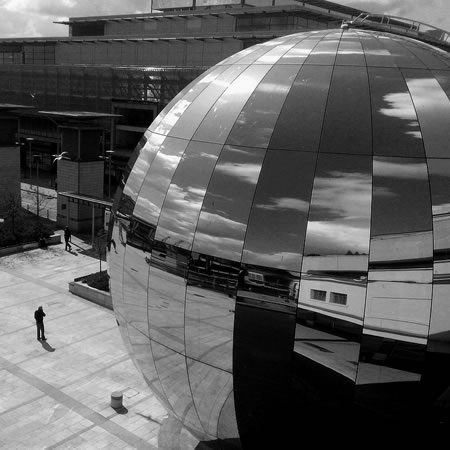Can you predict the future?
Do you know what life will be like next year, in five years, in ten years?
Over the last year or so I have been doing a few keynotes and presentations entitled the future of learning. I do start with a caveat that I don’t know the future for sure and that no one can really predict the future…
Though as a reflective person I do look back at the work I have been doing on mobile learning and I think there are lessons to be learned about the journey I have travelled.
This is me in 2006 based on work I was doing in 2004 and 2005.
This work came from mobile stuff I was doing back in the late 1990s. Back then I worked for an organisation called at-Bristol, a hands-on science centre in the middle of Bristol.

One of the projects we started working on was with HP looking at how we could use an HP Jornada on our then fledgingly wireless network to allow visitors additional and enhanced information on webpages about the exhibits. One of the key questions at the time was how we got the URLs into the devices at the right place. Then we decided to use HP’s Jetsend IR technology to “squirt” the URL to the Jornada. Of course since then the technologies have moved on and importantly so have the public. Today you would probably let the visitors use their own devices and smartphones. You would use QR codes, Bluetooth or more probably in the future RFID to find out where the visitor was before sending them the information (or letting them access the information via QR codes). If the attraction was outside then GPS could be used. The key though was not the technology but the concept of enhancing a visitor’s experience with additional content through a mobile device.
After leaving at-Bristol and joining the Western Colleges Consortium, I continued to work on mobile learning; at that time there was no funding available.
When I was working on mobile learning all those years ago, the reason was that mobile phones and mobile devices were becoming more sophisticated and more useful to consumers and business. I knew then it would only be a matter of time before they become useful to education and importantly a focus for policy and funding.
And in 2007 along came MoLeNET, millions of pounds of capital funding with a focus on mobile learning in FE.
There is no way that I would call myself a futureologist, but from an FE perspective I am looking at how new technologies can enhance and enrich everyday life, as before long these technologies will enter education.
So the big question is what am I working on now? What do I think will have a real impact in education, not just for learners, but also for funding and projects.
Well I am not working on Second Life or MUVEs. These do have some great application to learning, however until consumers start to use these technologies a lot more, than we won’t see a big change in their use in education.
Social networking and Web 2.0 are very big in the consumer field at the moment, Facebook is everywhere and corporate and entertainment use of these tools is now much more widespread than it was just a year or two ago.
As a result policymakers will start to think about how these tools and services can be used in education. And where thinking starts, funding usually follows…
So what about next year or the year after?
Well for me the “next big thing” is e-Books and e-Book Readers. These will hit the consumer market big time over the next three years. We will see many more people reading books, magazines and newspapers via devices such as the Apple iPad, Microsoft Courier and other devices not yet on the market. More publishers and broadcasters will start to think about how they are going to use these devices and start offering content on them, think of BBC iPlayer and its availability on the iPhone.
As a result policymakers will start to think about how these new technologies can be used in education. And where thinking starts, funding usually follows…
You see at the end of the day, it will not be how these products are used by educators, it’s how they are taken up and used by consumers and business. Whether that is right or wrong, is not really the case, as more often this is how it happens now, and has happened over the last twenty to thirty years, with most technologies.

James
How could you leave that giant metallic ball??!
What a cool place to work at.
Futurologist… Hmm, I’m not one either but I do like to think of myself as some sort of Edu-Tech Innovator.
Let’s face it, we’re not working at Apple Labs, or Google development – but we are trying to work toward embedding cutting edge hardware & software into the college without causing too many mental-breakdown casualties in the Staff Room 🙂
Thinking about convergence of technologies, I do see a convergence of educational tech, business tech and consumer tech. It is often how consumers take-up the technology that makes a huge difference to the success of a technology – the Viral effect – it’s what drives the market.
If consumers use certain types of technology, should we start to use it in education? Damn right we should… we meet the learners using tech they understand. I caught something on Radio4 last week (sorry can’t remember what it was now) – they were talking about how e-mail was a dead communication tool for learners; learners prefer the instant message – because they live in the present.
If they live in the present – I do think it is up to us to look to the future. 🙂